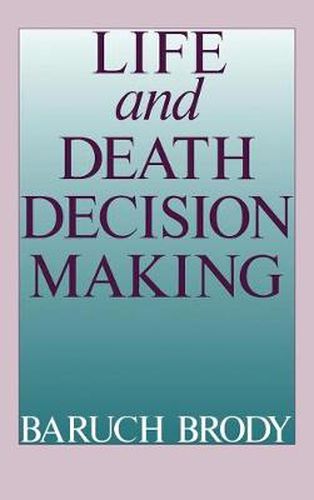Readings Newsletter
Become a Readings Member to make your shopping experience even easier.
Sign in or sign up for free!
You’re not far away from qualifying for FREE standard shipping within Australia
You’ve qualified for FREE standard shipping within Australia
The cart is loading…






Integrating theory with realistic case studies, this book examines the practical application of moral theory in clinical decision-making. With forty composite cases based on actual clinical experiences, the author describes key moral problems raised by modern medicine. He then demonstrates how these dilemmas can be resolved using a problem-solving framework termed pluralistic casuistry. This approach is pluralistic in that it accepts the relevance of many different moral grounds, drawn from different traditional moral theories, each of which may seem self-contained and hence in conflict with other claims. Consequently, the author stresses the need to achieve a synthesis of these traditional moral theories, rather than treating them as competitors. His approach is casuistrical in the sense that it considers the important differences between the cases at issue and applies the different moral appeals in different ways. The richly detailed case studies will challenge readers, clarify the ethical issues involved, and indicate how theory and practice can be integrated. Containing a multiplicity of factors faced in clinical crises, they are ideal for group discussions concerning the ways in which theory relates to actual life-or-death situations.
$9.00 standard shipping within Australia
FREE standard shipping within Australia for orders over $100.00
Express & International shipping calculated at checkout
Integrating theory with realistic case studies, this book examines the practical application of moral theory in clinical decision-making. With forty composite cases based on actual clinical experiences, the author describes key moral problems raised by modern medicine. He then demonstrates how these dilemmas can be resolved using a problem-solving framework termed pluralistic casuistry. This approach is pluralistic in that it accepts the relevance of many different moral grounds, drawn from different traditional moral theories, each of which may seem self-contained and hence in conflict with other claims. Consequently, the author stresses the need to achieve a synthesis of these traditional moral theories, rather than treating them as competitors. His approach is casuistrical in the sense that it considers the important differences between the cases at issue and applies the different moral appeals in different ways. The richly detailed case studies will challenge readers, clarify the ethical issues involved, and indicate how theory and practice can be integrated. Containing a multiplicity of factors faced in clinical crises, they are ideal for group discussions concerning the ways in which theory relates to actual life-or-death situations.